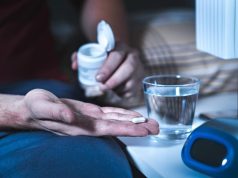Reduction in blood pressure greater with lorundrostat versus placebo in patients receiving two to five medications with BP ≥140/90 mm Hg
By Elana Gotkine HealthDay Reporter
WEDNESDAY, April 30, 2025 (HealthDay News) — For patients with uncontrolled and treatment-resistant hypertension, lorundrostat is associated with greater reductions in blood pressure than placebo, according to a study published online April 23 in the New England Journal of Medicine.
Luke J. Laffin, M.D., from the Cleveland Clinic Foundation, and colleagues conducted a double-blind, randomized trial involving patients who were receiving two to five antihypertensive medications and had a blood pressure measurement of 140/90 mm Hg or higher obtained during an office visit. Participants underwent a standardized antihypertensive regimen for three weeks; those with an average 24-hour ambulatory blood pressure of 130/80 mm Hg or higher were randomly assigned to receive placebo, lorundrostat (50 mg daily; stable-dose group), or lorundrostat starting at 50 mg daily and increasing to 100 mg daily if systolic blood pressure was ≥130 mm Hg after four weeks (dose-adjustment group).
Two hundred eighty-five patients were randomly assigned: 94, 96, and 95 to the stable-dose group, dose-adjustment group, and placebo group, respectively. The researchers found that after 12 weeks, the least-squares mean change in 24-hour average systolic blood pressure was –15.4, –13.9, and –7.4 mm Hg in the stable-dose, dose-adjustment, and placebo groups, respectively. The placebo-adjusted change in blood pressure was –7.9 and –6.5 mm Hg in the stable-dose and dose-adjustment groups, respectively. In the combined lorundrostat groups, the placebo-adjusted change in 24-hour average systolic blood pressure from baseline to week 4 was –5.3 mm Hg.
“Aldosterone synthase inhibition with lorundrostat effectively lowered blood pressure in patients with uncontrolled and treatment-resistant hypertension,” the authors write.
Several authors disclosed ties to biopharmaceutical, medical device, and medical technology companies, including Mineralys Therapeutics, which is developing lorundrostat and funded the study.
Copyright © 2025 HealthDay. All rights reserved.








